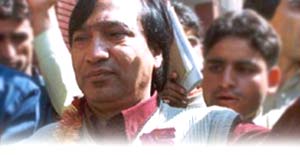The Election Interview/Mohammed Yousuf Tarigami



It has been a long journey for Mohammed Yousuf Tarigami. From being an unknown South Kashmir village youth, he is now one of the state's most articulate politicians.
Heading the Communist Party of India, Marxist, a party with hardly any numerical strength in the legislative assembly, Tarigami, its state secretary, remains one of the saner voices in Jammu & Kashmir's political circus.
Tarigami is playing the negotiator in the stalemate between the Congress and the People's Democratic Party over the formation of a new government in the state. He spoke to Basharat Peer in Srinagar after the imposition of governor's rule in the state. Excerpts:
Political parties have failed to reach an agreement over government formation and governor's rule has been imposed. What do you make of this situation?
The ardent proponents of the status quo and the bitter opponents of a change have temporarily won the day in Kashmir by creating conditions for the imposition of governor's rule.
Who exactly are you referring to?
It is not the time to name those people. But the verdict was for a change and those against it wanted the status quo to continue. On the other hand, the political parties claiming to be entrusted with carrying out the verdict of the people have belied the expectations of the people. They have failed to stop the vested interests from succeeding in their game plan.
You are again not mentioning names...
People know the names. I do not think it is the right time to spell them out.
You were talking to the Congress and the PDP, who are both claiming the chief ministership in a possible coalition of the two with the support of other small parties and independents. Why did the negotiations fail?
We wanted the government to be formed. And I tried to convince the Congress and the PDP to iron out their differences. I talked to both about the issues that could figure in a common minimum programme and there were no major hitches in arriving at that. But it finally boiled down to the chief ministerial post.
But there was a formula that you offered to the PDP on that issue. What happened?
The formula I offered was that the chief minister could be from one group and the other group would get important ministries in the Cabinet. I also talked about a deputy chief minister from one party and CM from the other. Although it is not an institutionalised post, my offer was that the Cabinet amend the rules and evolve a mechanism to give teeth to the deputy CM's post.
But why was it rejected by the PDP? What was their argument?
PDP president Mufti Mohammad Sayeed argued that since Kashmir was under focus, the chief minister should be from Kashmir. After that we offered him the choice of a Congress chief minister from the valley, but he did not agree. Finally, he said that the PDP had the mandate from the valley, so the chief minister should be from the valley.
Do you agree with the PDP president?
No. If the valley had to be the decisive factor, then the National Conference has more legislators from the valley than it has in Jammu. Farooq Abdullah was a Kashmiri chief minister. Why did the people remove him?
These claims that a particular party exclusively represents the sentiments of Kashmir are not correct.
What then is the criterion for chief ministership?
The issue is who will be able to deliver more for the people of J&K. The welfare of the whole state has to be kept in mind. There was serious trouble in Jammu region with the sinister efforts of the RSS [Rashtriya Swayamsevak Sangh] to trifurcate the state on a communal basis. But the people of Jammu defeated their designs. We have to strengthen that sentiment. Polarisation on regional lines would only help divisive forces like the RSS and the VHP.
Now the state is under governor's rule and there are no signs of a resolution of the deadlock on government formation.
There is a silver lining to this development. It should be an eye-opener for all those working for an alternative. If the uncertainty continues, those against a change of government [read the National Conference] will get a chance to discredit the mandate. The Congress, the PDP, and others working towards government formation must unite with a stronger sense of urgency.
You have entered into an alliance with a group of independents and formed the Democratic People's Front. It includes people from diverse political schools of thought. What made you join hands with them? What is the next step the DPF is going to take?
The CPI-M entered into this alliance because we could agree on certain important issues like broadening the political process, improving the human rights situation in Kashmir, providing a responsible administration, and talking to people still outside the democratic process. We have been trying and are still trying to get the Congress and the PDP to sink their differences and form a stable alternative.
After governor's rule was imposed, you blamed vested interests from Delhi to Srinagar for being responsible for this turn of events. Whom are you blaming in Delhi? Is it the central government?
Maybe some sections of the government itself. Whatever the differences between the BJP and the Congress at the national level, Kashmir cannot be the battleground for that.
Back to top
Tell us what you think of this interview